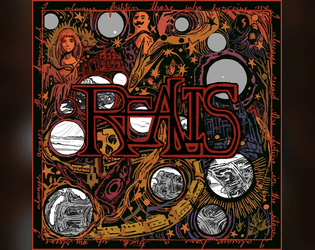I really appreciate the question because it led me to realizing that I should put it in those words directly in the book!
Austin Walker
Creator of
Recent community posts
Hey there, pages 72 and 73 have guidance on Realization. I would say "When I push myself to the limits" is probably too broad, at least for my table, or at least without going in knowing that we'd really limit to "push myself to the limits" really far. A good rule of thumb for Realization is: Can it be falsified? I.e., could there be a situation where the user freely and unworriedly says "Yeah I can't use my sentence in this circumstance." If the answer is no, then it probably isn't Realized. So, if your table is really willing to judge whether you are "pushing yourself to your limits," then yeah, it probably works. But if you're just using it to characterize what the use of the sentence looks like, then no, probably not great.
A one on one game is totally doable, with the note that you'd have to make some decisions about Bonds and Band Sentences--both of which are designed to tie player characters (and their players) together. Either house rule that those can operate with NPCs or else the GM should account for the fact that the PC does not have their full toolbox available to them.
That'd be a great house rule and I'd love to hear how it works out! But as written, no. Countered Sentences are "unable to be used for the remainder of the scene." A fully character with all Countered Class Sentences must rely on Moon Sentences, Bonds, Ephemera, and, of course, their Dream to get them out of whatever scrape they've found themselves in.
Thanks so much for giving it a read.
I can't speak for all GMs, but as I've played it:
Faction and NPC Sentences begin entirely secret, and are only revealed on use.
Moon Sentences can begin secret or public or some mix thereof, depending on PCs and their relation to the given Moon. If they're from the Moon in question, or have spent a lot of time there, they probably know the big ones. But a Moon might have some secrets (like the one about Daniley's Unyielding Engine) which they discover during play. Plus, Moons can have Sentences added on the fly by Players by spending their Tokens.
In the Podcast play example, the public Sentences reflected that the character in question had been to those places before, encountered those Factions and NPCs, etc. Also, once a Sentence is public, it is marked in public and only through play--so players should always have the ability to know if a Sentence has been Primed and could potentially be Realized the next time they come up against it.
And important note: Illuminating failure doesn't require opposition, though it can include that, if you'd like. It requires only uncertainty. (That's also true for requesting a Means from a player, you don't need to have specific opposition, you can just say 'Hey, that sounds like something that might be uncertain. Do you have a Means to point to that would make it doable for you?')
Hope that helps!
Yes, absolutely, in two major ways.
First, tonally, saying the word 'always' really has an impact in play. The initial draft of this game allowed for other phrasings, and it didn't really hit. 'I always do X' really shifts the sense of deploying a Sentence.
Second, mechanically, Class Sentences aren't only deployed in Conflicts, they're also used when facing uncertainty, which is only possible because of "always." If the Runner didn't always "find a way through or around," and they came to a locked door, how would we know that they could get past it? Well, in another game, where they had something like a skill like "lockpicking" or an aspect like "knows how to find a way through or around" we might ask "well, how well do they know that?" and to find out we'd maybe roll some dice. Here, we don't have to: They always find a way through or around.
The only thing powerful enough to stop that "always"--in the Wordwrights' vision of Realis--is another Sentence.
A GMing guide is on my list for the full release for sure! A lot of play testers have been able to get campaigns up and going with what’s here, so I’m confident it does work.
One important note: the PCs should NOT be the only ones doing things, or be the primary Actors. This game doesn’t work only on “what do you do,” it requires “Someone is trying to use [sentence X] with [Y intent], can anyone counter that?”



